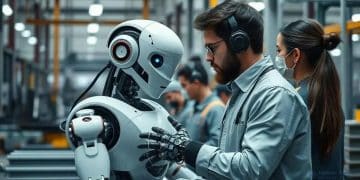Role of agentic AI in automating workplace tasks

The role of agentic AI in automating workplace tasks enhances efficiency, improves productivity, and shapes future collaboration between humans and AI technologies.
Role of agentic AI in automating workplace tasks is becoming increasingly significant as organizations seek to boost productivity. Have you ever wondered how AI might change your daily tasks? Let’s dive into this evolving landscape.
Understanding agentic AI and its capabilities
Understanding agentic AI and its capabilities is essential in today’s tech-driven world. This type of artificial intelligence not only performs tasks but also makes decisions independently. With the rapid growth of technology, recognizing how agentic AI can function within various environments is crucial.
Key Features of Agentic AI
Agentic AI systems are designed to learn from their environments and improve over time. They possess functionalities that allow them to:
- Make real-time decisions based on data analysis.
- Adapt to new information seamlessly.
- Interact with users in a human-like manner.
Furthermore, these systems can assist various industries by enhancing productivity and reducing errors. They analyze large datasets quickly and suggest the most effective solutions to problems. For example, in customer service, agentic AI can handle inquiries autonomously, allowing human employees to focus on more complex tasks.
Applications Across Industries
Agentic AI is becoming a game-changer across many sectors:
- Healthcare: Is used to diagnose conditions and recommend treatments.
- Finance: Analyzes market trends and detects fraudulent activities.
- Manufacturing: Optimizes supply chains and improves operational efficiency.
By understanding the capabilities of agentic AI, businesses can make informed decisions on how to implement these technologies effectively.
The potential for innovation and increased efficiency is significant. As more organizations adopt agentic AI, its role in shaping the future of work becomes even clearer, paving the way for new possibilities and advancements.
Key benefits of automation in the workplace

Key benefits of automation in the workplace are transforming how companies operate. Automation involves using technology to perform tasks that were once done by humans. This shift not only improves efficiency but also enhances job satisfaction.
Increased Efficiency
One of the main advantages of automation is the increase in efficiency.
- Tasks can be completed faster without human error.
- Systems can operate 24/7, reducing downtime.
- Employee workload is lightened, allowing focus on more critical tasks.
This leads to a more streamlined workflow and improved productivity across teams. Businesses can respond to customer demands more swiftly, gaining a competitive edge in their market.
Cost Savings
Another significant benefit is cost savings. By automating routine tasks, organizations can:
- Reduce labor costs associated with repetitive jobs.
- Minimize errors that could result in costly corrections.
- Optimize resource allocation strategically.
These financial advantages allow companies to reinvest in growth and innovation. Moreover, savings can be directed toward enhancing employee training or developing new products.
Enhanced Accuracy
Automation also provides enhanced accuracy. Machines can analyze data and perform calculations without mistakes. This leads to:
- Better data management and reporting.
- Improved quality of services and products.
- Increased customer satisfaction due to fewer errors.
When mistakes are minimized, companies build trust with their clients, establishing long-term relationships and loyalty.
As automation continues to evolve, its advantages will become even more apparent, allowing businesses to thrive in a rapidly changing landscape. By embracing these technologies, organizations set the stage for future success and resilience.
Real-world applications of agentic AI
Real-world applications of agentic AI showcase its ability to transform various industries. By automating tasks and making informed decisions, agentic AI significantly enhances productivity and efficiency.
Healthcare Innovations
In the healthcare sector, agentic AI has become a powerful tool. It helps in:
- Diagnosing diseases more accurately through data analysis.
- Suggesting treatment plans based on patient history.
- Monitoring patient health with wearable technology.
These applications lead to better patient outcomes and streamlined processes in medical facilities.
Finance and Banking
Agentic AI also plays a crucial role in finance. It helps banks and financial institutions by:
- Analyzing transaction data to detect fraud quickly.
- Predicting market trends for strategic investments.
- Automating customer service inquiries, improving response times.
This allows for enhanced security and faster, more accurate financial services that can adapt to changing market conditions.
Manufacturing and Supply Chain
The manufacturing industry benefits greatly from agentic AI. By implementing AI-driven systems, companies can:
- Optimize supply chain logistics and reduce costs.
- Predict equipment failures before they occur.
- Automate quality control to ensure high standards.
These advancements help manufacturers stay competitive while maintaining product quality.
Agentic AI’s real-world applications extend beyond these industries. As technology evolves, its potential grows, leading to innovative solutions that can improve efficiency and effectiveness across various sectors. This transformation will significantly shape the future of work and how we interact with technology.
Challenges in implementing agentic AI solutions

Challenges in implementing agentic AI solutions are crucial to understand for any organization considering this technology. Even though agentic AI offers many benefits, its integration comes with significant hurdles.
Technical Complexity
One major challenge is the technical complexity involved in deploying these systems. Organizations often face:
- Difficulties in integrating AI with existing systems.
- High costs associated with infrastructure upgrades.
- The need for specialized knowledge and skills.
Without proper expertise, companies may struggle to fully utilize agentic AI’s capabilities. Additionally, maintaining these systems requires ongoing technical support, which can be a burden.
Data Privacy Concerns
Data privacy is another critical issue. Agentic AI relies on vast amounts of data to function effectively. This raises questions about:
- How data is collected and managed.
- Ensuring compliance with privacy regulations.
- Protecting sensitive information from breaches.
These concerns can slow down the implementation process, as organizations must establish trust with their users and customers.
Resistance to Change
Human factors also play a significant role in the challenges of deploying agentic AI. Many employees may feel:
- Threatened by job displacement due to automation.
- Skeptical of AI’s decision-making abilities.
- Uncomfortable adapting to new technologies.
To overcome this resistance, organizations need to foster a culture that embraces technology, providing training and support to employees.
Creating transparency about the benefits of agentic AI can help ease fears and promote a more positive attitude toward change.
Understanding these challenges is essential for successful implementation. By anticipating potential roadblocks and planning accordingly, organizations can enhance their chances of successfully integrating agentic AI solutions into their operations.
Future trends of agentic AI in work environments
Future trends of agentic AI in work environments will shape how businesses operate in the coming years. As technology evolves, so will the capabilities and applications of agentic AI systems.
Greater Integration with Human Workforces
One notable trend is the increase in collaboration between humans and agentic AI. Work environments will see:
- Enhanced teamwork, where AI assists employees in decision-making.
- Personalized AI tools tailored to individual productivity needs.
- Training programs that help workers better cooperate with AI technologies.
This integration will create a balanced workplace where AI enhances human skills instead of replacing them.
Advancements in Natural Language Processing
Another important direction for agentic AI is the improvement of natural language processing (NLP). This means that AI will be better equipped to:
- Understand and respond to human inquiries more effectively.
- Assist in drafting emails and reports with minimal input from users.
- Provide real-time language translation in diverse workplaces.
As NLP capabilities advance, communication between teams, including remote and global collaborators, will become smoother and more efficient.
Focus on Ethical AI
Future trends will also emphasize the importance of ethical considerations when implementing agentic AI. Organizations will focus on:
- Developing AI systems that are fair and unbiased.
- Ensuring transparency in AI decision-making processes.
- Establishing regulations for responsible use of AI technologies.
This commitment to ethics will foster trust among employees and customers, as businesses demonstrate their dedication to responsible practices.
As we look ahead, the trends in agentic AI indicate a future where technology and human collaboration become increasingly seamless. By adapting to these changes, businesses can prepare for a more innovative and efficient work environment that leverages the strengths of both humans and AI.
FAQ – Frequently Asked Questions about Agentic AI in the Workplace
What are the main benefits of implementing agentic AI in my organization?
Implementing agentic AI can increase efficiency, reduce costs, and enhance employee productivity by automating routine tasks.
How can agentic AI enhance team collaboration?
Agentic AI can provide personalized tools that assist team members in decision-making, leading to improved communication and collaborative efforts.
What challenges should I expect when integrating agentic AI?
Challenges may include technical complexity, data privacy concerns, and possible resistance from employees who fear job displacement.
How does agentic AI impact workplace ethics?
The use of agentic AI raises ethical considerations, such as ensuring transparency in decision-making and developing unbiased systems that foster trust.





